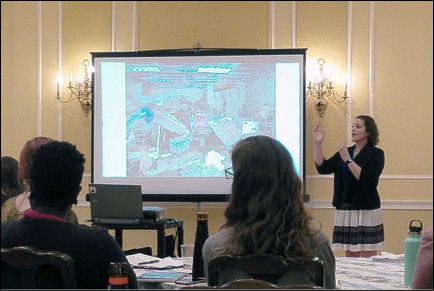Presentation by Stacy Bowe (SCRI Training Coordinator)

The Smithsonian Cultural Rescue Initiative (SCRI) was founded in 2010 following the institution’s involvement in the Haiti Cultural Recovery Project. The initiative operates on a 4-pillar approach: recognition, research, resilience, and response. During her presentation, Bowe focused on SCRI’s role in the third and fourth pillars. SCRI provides preparation and response training focused on what to do immediately after an event has occurred. In the ideal collections emergency response scenario, there would be trained staff, adequate documentation, ample supplies and funding, and a reasonable amount of time allotted. The reality during an actual collections emergency, however, is that this level of preparation is rarely present, and if not handled properly, this emergency could become a disaster. All collections emergency responses are affected by the context of the situation, organizational priorities, timing, accessibility, skill of the team, and communication; in addition, there are a variety of unexpected situations that could negatively impact the response including:
- Lack of implementation of the disaster plan
- Limited engagement with non-specialists
- Assumptions regarding normal operations in an emergency situation
- Having an underdeveloped documentation plan
- Risk assessment being approached from only a collections or conservation point of view
- Limited access to supplies in the immediate aftermath of an emergency/disaster
SCRI offers training to help address some of these potential issues by encouraging cross-disciplinary partnerships, developing “soft skills” (such as conservators developing effective communication skills for interacting with non-specialists during an emergency), and providing practical disaster plan exercises. SCRI training is open to everyone including: museum professionals (directors, registrars, collections managers, conservators, etc.), facilities managers, emergency first responders, and military personnel. Bowe introduced the Heritage Emergency and Response Training (HEART) program which SCRI co-sponsors with FEMA’s Office of Environmental Planning and Historic Preservation. This course is offered to participants free of charge thanks to the generous support of the Mellon Foundation, and according to SCRI’s website, the 2017 HEART program trained “25 participants selected from a range of museums, libraries, archives, and emergency management organizations representing 21 states and the Territory of Puerto Rico.” For more information about the program and how to apply, visit: https://culturalrescue.si.edu/hentf/training/.
And as the presentation concluded, Bowe discussed two handouts: UNESCO and ICCROM’s “Endangered Heritage: Emergency Evacuation of Heritage Collections” and Stacy Bowe’s list “These are a Few of My Favorite Things” which included website links for the Harvard Libraries’ Collections Emergency Benchmarks, the Council of State Archivists’ Pocket Response Plan, the Image Permanence Institute’s Dew Point Calculator, the National Park Service’s Conserve-O-Grams series 21, FAIC’s Emergency Response and Salvage Wheel, and FAIC’s poster Working with Emergency Responders.
About the speaker: Stacy Bowe is an enthusiastic cultural heritage professional with over 10 years experience gained from the archaeological, museum, and conservation fields. She earned her B.A. in Archaeology from Dickinson College in 2006 and her M.A. in Managing Archaeological Sites from University College London in 2013. Bowe currently works as the SCRI Training Coordinator in developing and expanding the organization’s international and domestic training programs that are focused on responding to emergencies involving cultural heritage. One of SCRI’s domestic programs is the one-week HEART training course that was discussed during this WCG event.
Summarized by Keara Teeter, Graduate Conservation Intern, WUDPAC